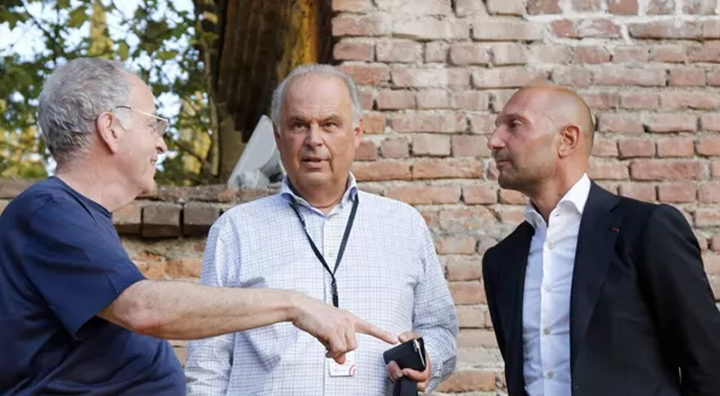
Tsinandali Festival 2019
Nestled in the heart of the Georgian region of Kakheti, at the crossroads of Europe and Asia, the inaugural Tsinandali Festival is set to be a festival like no other. This fall, we are proud to be streaming 17 concerts live from the Tsinandali Estate.
A collaboration between the Georgian government, generous private donors, and a handful of passionate individuals, the Festival has been designed to inspire young musicians from the Caucasus and neighboring countries. The newly formed Pan-Caucasian Youth Orchestra will perform under the baton of the illustrious Gianandrea Noseda, alongside some of the world’s greatest classical musicians, from Fazil Say to Yuja Wang.
We caught up with festival founders Martin Engstroem and Avi Shoshani to find out more about this spectacular project…

What was it that made you choose to be involved in the Tsinandali Festival?
Avi: When we were approached by George Ramishvili to build this festival, I went to Tsinandali and was immediately very impressed.
Martin: It was the willingness of George Ramishvili to create a cultural centre in a region that is not only amazingly beautiful and historic, but also one that dearly needs to develop better understanding between its neighbours.
Avi: When we had the idea to create the Pan-Caucasian Youth Orchestra from the surrounding countries, we knew we were doing something special, and that it had a message. This makes me very proud, to develop this orchestra and to be involved in it.

The Festival made the formation of the PCYO a priority from the very beginning. Why?
Martin: Because just putting on a festival with some nice music isn’t enough. You can perform nice music in nice venues in many places in Europe, but since this region has been so violated and so full of conflict for so many years there had to be a message, a reason, in what we were doing. If you look at a map of the neighboring countries and their collective histories, you realize that the only way to approach each other is through culture. Music is a universal language, and from my years in Verbier I’ve seen how Russians, Americans, you name it—they come together if they have a common denominator—and that common denominator is music.
So did your experience at Verbier influence your decision to start this youth orchestra?
Martin: For sure it’s played a vital role, as I was able to hire Claudio Vandelli who put together the first youth orchestra at Verbier. By getting him to start the Pan-Caucasian Youth Orchestra with Avi and myself, we were off to a flying start. He has done an amazing job, and I look forward to hearing all these musicians come together.
Was the process very long? — that is, making the Tsinandali Festival dream a reality?
Avi: No, it happened very quickly, as the vision and commitment of George and his team are remarkable. We discuss things, agree on a plan, and they’re executed right away.
Martin: From our initial meeting with George in Verbier during the summer of 2017, it took only a year for the Festival to come together and to have most of the plans in place.

Classical music festivals are becoming more and more popular, but with so many to choose from, and many already long established, what makes Tsinandali special?
Avi: For me, it’s the location of the Tsinandali festival, the combination of old and new. The best example is the open concert venue where the walls are ancient, but the roof and pillars are completely new. They blend perfectly together, and I love this combination of the old and new which is a feature of the whole area. The fact that the hall sits on ancient wine cellars creates something very exciting and special.
Wonderful! Is there anything about the musical or cultural history of the region that you’d like to share?
Martin: It’s claimed that wine was invented here 8,000 years ago, there are incredible ancient monasteries to be visited, and the whole region is full of wild undeveloped nature. There are beautiful lakes, completely unspoilt, and 5,000 metre high mountains with permanent snow on them. The old town of Tbilisi is worth a trip in its own right and the people are among the most hospitable you could ever hope to meet. And never forget the food which is fantastic!

Avi: So, it’ll be a combination of unique archaeological history, nature and the best music making one can think of!
What are the logistical challenges of presenting a festival with so many performers, orchestras, guests etc. in the heart of Georgia’s wine country? It’s quite a mammoth project!
Avi: It’s a challenge, but we know how to handle such situations and we have a great team. Martin and I are very experienced and we have a very good head of the Academy who has worked with us for many years in Verbier. We have all the ingredients to believe we’ll make it a success… I’ve been very impressed by the local staff; in our meetings, Martin and I fire questions at them based on our experience in Verbier, and they all get answered.
You’ve briefly mentioned the venues already – can you tell us more about their special qualities?
Martin: When Avi and I first visited Tsinandali in September 2017, the main venue was already under construction. We had given our concept for a music festival in Tsinandali to George and for that concept we also needed a chamber music hall, not just an orchestral hall. We also needed extra accommodation for a campus for the youth orchestra at the venue so that the young musicians can spend time together and not be scattered around the area. George agreed, and a new chamber venue and a new hotel were built, which are both vital elements to making Tsinandali special.
When we heard the first concert given in the hall, in September 2018 with Zubin Mehta and the Israel Philharmonic we realised straight away that the acoustic is excellent, and the same goes for the chamber hall, so we have all the ingredients to make this work.

Avi: The acoustic of the main hall, which is open air, is unlike any open-air concert venue I’ve ever experienced… This is the only one I know that’s semi-open but doesn’t need amplification. What’s nice about it is that it seats 1,000 people, not too big, so it retains the atmosphere of a concert hall. The roof doesn’t just cover the stage either, but also the audience, so everyone is connected.
Speaking of connection, what do you hope the young musicians will take away from their experience at Tsinandali?
Avi: …I want them to leave with the feeling that they have achieved something, learned something, raised their standard of performance and met musicians from the surrounding areas, to understand that music is a great language, and to increase their understanding of others and to forge friendships.
Martin: I want them to leave with a better understanding of, and for, each other. They should realise the power of sharing the love of music and being able to grow through music. Most of the young musicians coming to the Pan-Caucasian Youth Orchestra have very poor instruments so we are working on upgrading them so that they can continue their studies elsewhere. By being part of the Tsinandali Festival they will make contact with other musicians which is essential. Being a musician is the same as any other profession – you need a network. You can’t just play for yourselves; we need to encounter others who can help us move forward and in this way Tsinandali will become a centre of hope and development.

What are your hopes for the festival? What would be the best possible outcome in September?
Martin: If you look at history, this corner of the world has had conflict since forever, and still does… It is my hope that this cultural centre can become as popular with Armenians as it does with Turks, Azerbaijanis, Russians, as well as Georgians. There will be a permanent cultural exchange throughout the year, not just during the Festival.
Avi: That the message between the musicians from the different nationalities in the youth orchestra is shared far and wide. That the young musicians themselves go home and tell everyone how great it was to play with musicians from other countries…
Martin: …This will be an important cultural melting pot — that’s definitely our goal.
Credit: Music with Vision


